A brief history of Olympic dissent: Berlin 1936
Selecting China as this year's host for the Olympic Games has opened the country up to intense media exposure over issues like human rights and the environment. It has also made the Games a focus for protest over Tibet. It seems that ever since the modern Games were founded, politics, dissent and protest have been part of the spectacle. I've been writing about how these phenomena manifested themselves at the Games in 1896, during the pre-war years, and at the resumption of the Olympics after World War I.
In 1936 the Games headed to Berlin, where they had first been scheduled to appear in 1916. The event was hi-jacked by Hitler's Nazi Party to provide a propaganda platform for the Third Reich in one of the Olympic movement's most politically shameful episodes.
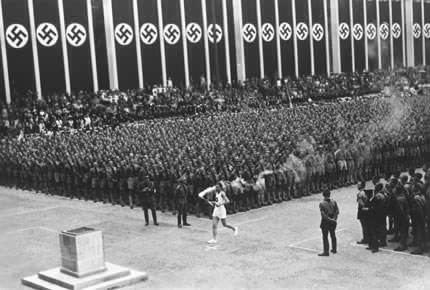
Boycotting the Nazi Olympics
The Olympic Games had been awarded to Weimar Republic Berlin in April 1931, before the rise of Hitler and his Nazi Party. Germany had only been re-admitted to the Games in 1928 after being excluded as one of the 'guilty' countries after World War I. Hosting the Games in the country was a gesture of normalisation of relationships. However, German internal politics soon saw that ideal rendered irrelevant.
There was a movement to boycott the games within the USA, but opinion was somewhat divided. Whilst some camps felt any participation showed support for Hitler's anti-semitic policies, the counter-argument was that going and winning would undermine his racial superiority theories.
The views of those within the American Olympic movement were also significant. The President of the American Olympic Committee was Avery Brundage. With apparently no sense of irony, and using rhetoric that could have been taken straight from the Third Reich's Information Ministry, Brundage declared that there was a "Jewish-Communist" conspiracy to keep the USA from competing at the games.
There was also dissent in the Netherlands, with posters produced protesting that the Games were to be held in Nazi Germany.
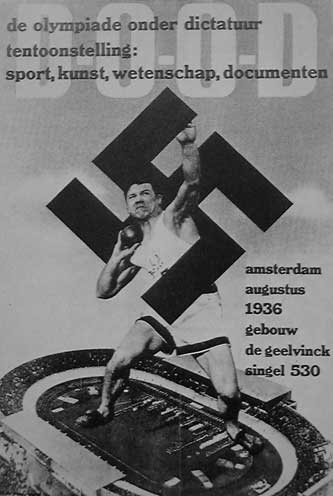
By picking one medal-winning athlete with Jewish ancestry, Helene Mayer, the German authorities "proved" their selection had been fair and non-discriminatory to the satisfaction of the IOC. The Jewish Virtual Library has an excellent article on the impact of the 1936 Games on Jewish athletes.
With the benefit of hindsight it seems that a boycott would probably have been the better option - however contemporary campaigners and organisers had no way of knowing that Hitler was going to turn the games into a propaganda set-piece, nor was there any precedent for a widespread en masse boycott of the Olympics.
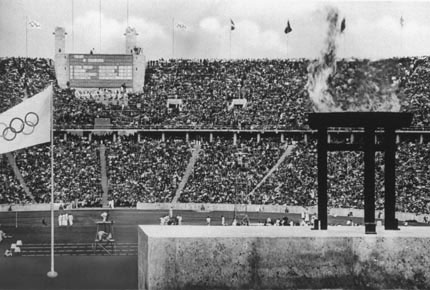
The games themselves were carefully stage-managed, and filmed by Leni Riefenstahl for the benefit of the German people. There are some excellent first-hand accounts on the Internet from women athletes about how they had to wait in the heat for Hitler to arrive on the opening day. 25 large screens were set up in Berlin to transmit pictures from the games to the streets, and the Olympic complex remains an impressive set of buildings to this day.
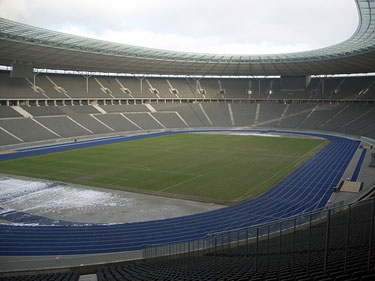
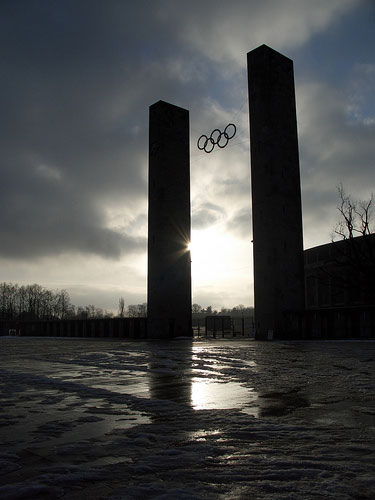
As part of the opening ceremony, a symbolic olive branch was presented to Hitler by Greek athlete Spiridon Louis, who won the marathon race in the inaugural 1896 Games in Athens. Five years later, Germany was to invade Greece.
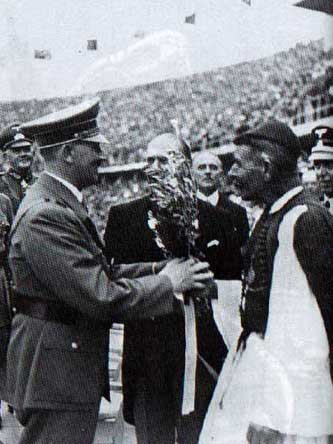
What the Nazis couldn't stage-manage was the results of the competition...
Jesse Owens
"Hitler didn't snub me—it was FDR who snubbed me. The president didn't even send me a telegram"
The story of how Jesse Owens smashed Hitler's theories of racial superiority on the track and field, which led to the Nazi leader refusing to present him with his medal or shake his hand have been an enduring myth about the 1936 Olympics, oft-repeated even in recent documentaries about the games.
Unfortunately, despite there being a lovely ring of poetic justice about it, the myth isn't true.
Hitler had congratulated German athletes on the first day of the 1936 Olympics, only to be informed by IOC officials that he should congratulate all athletes or none, in order to show neutrality as the presiding head of state. Hitler opted to congratulate no-one, and was not even in the stadium when Jesse Owens was securing his medals.
It was Owens' treatment back home in the USA that tends to get glossed over in any re-telling of the tale. He was never invited to the White House to be congratulated by an American President at the time of his triumph, and he ended up racing horses as a novelty act, and at one point was a bankrupt petrol attendant.
There was a ticker-tape parade in New York in his honour, but to attend the reception, as an African-American, he had to use the back elevator at the Waldorf-Astoria Hotel where it was held. The front one was reserved for white people. Later in his life he earned more official recognition, and made a living as an ambassador for sport, and by doing corporate motivational talks.
Thanks to the on-demand nature of the Internet, it is possible to put aside the questions of the right and wrong of the 1936 Olympics, and just admire Owens as an athlete. This YouTube clip features his stunning performance in the 100m sprint, which he wins with ease. The crowd reaction also seems to belie any idea that the German people in attendance did not admire his achievements.
Next...
Having used the 1936 Games as a propaganda tool, Hitler inadvertently ensured that the 1940 Games could not take place in Tokyo as planned by starting World War II. It was not until 1948 that the Games restarted, hastily arranged in London. In the next part of this series I'll be looking at some of the dissent and protest in the post-war games, leading up to the momentous events of the 1968 Olympics in Mexico.
I never knew a black athlete also finished second: Ralph Metcalfe, who went on to win gold in the 4x100 relay with Owens, and (it turns out) later became a US Congressman. I can't help feeling he's been a bit hard done by.